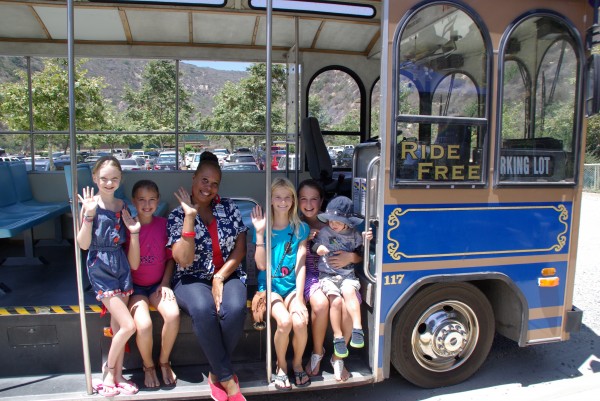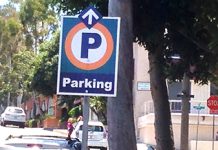Due to declining bus ridership, Laguna Beach will eliminate midday hourly transit service in hillside neighborhoods between 9 a.m. and 2 p.m. other than in summer, effective sometime in September, and drop its weekday route in North Laguna altogether.

Photo by Loreen Berlin.
Buses or trolleys will continue to run in the Top of the World, Bluebird Canyon and Arch Beach Heights neighborhoods every 30 minutes between 6:30 a.m. and 9 a.m. and 2:15 to 5:30 p.m. weekdays in the offseason, City Council agreed Tuesday, March 7.
The curtailed schedule was among a range of adjustments in the city’s $3.3 million transit program, which with grants and fares ultimately costs the city $1.1 million a year.
City buses picked up 84,137 passengers last year, an 18 percent decline in ridership since 2016, according to a staff report. The revised route and schedule will cut by half the cost of the $1.4 million bus system, where each round-trip fare costs the city $9.78, the report says. Transit service – either by bus or trolley — will resume a full schedule on weekdays in summer.
Council member Robert Zur Schmiede urged city staff to investigate and promote an alternative service, such as a discounted ride-hailing program, to fill the gap in hourly service in neighborhoods.
Three Top of the World residents voiced their opposition to cuts in neighborhood service. Gary Schwager said a lack of bike racks, confusing signage and changes in route hours contributed to the decline in ridership. He urged city officials to better market the service.
Two other significant changes in local transit service involve seniors and fans of the Ritz Carlton in Dana Point.
Residents 60 and older who rely on transportation for errands from the local nonprofit Sally’s Fund should anticipate a new mix of drivers by July that includes the ride-hailing service Uber, under the recommendation adopted this week.
Though council members demanded a gradual transition, they approved a 50 percent cut in the city’s existing $78,000 contract with Sally’s Fund to try an alternate program with on-demand drivers from Uber. Sally’s Fund drivers picked up 2,995 seniors at no charge in 2015, at a subsidized cost of $26 a ride, the report says.
Council member Steve Dicterow expressed reservations over the funding cut’s impact on users, who he said are at ease because they recognize familiar drivers. “I think it’s too drastic a cut,” he said.
Under a six-month pilot plan with Uber, city staff would assist scheduling with Uber drivers for rides that would be priced at $6 to $8, with a 50 percent reimbursement for seniors, the report says. Rides could be dispatched by phone rather than through a phone app and scheduled as long as a year in advance, Public Works Director Shohreh Dupuis added.
The city would continue to contract with Sally’s Fund for transportation for seniors who need some physical assistance on their errands, the report says. The recommendation included $63,000 to replace the city owned van provided Sally’s Fund. Fund president Eric Jessen expressed appreciation for the new vehicle.
Chris Quilter, president of Laguna Beach Seniors, urged city officials to consider a range of competitors offering seniors transit.
The other point of contention involved whether to discontinue summer and weekend trolley service to the Ritz Carlton. The southernmost stop on Coast Highway is a popular boarding point and often fills trolley seats even before it reaches the city limits.
Ultimately, the council rejected the staff proposal to eliminate the stop altogether. Instead, City Manager John Pietig suggested a route change to omit the Ritz Carlton stop on alternating southbound trolleys. The intent is to ensure seating capacity for South Laguna residents on some northbound trolleys.
In other shifts effective in summer, downtown parking meters will increase by 25 percent to $3.75 an hour, an effort to combat downtown congestion by enticing drivers to use less expensive peripheral parking, the report says.
No significant changes are planned in the city’s popular free trolley service, which experienced an 11 percent decline in boardings last year to 590,427, the report says. The trolley runs daily in summer and on weekends in the offseason.





[…] was pleased to see your announcement of City Hall’s decision to cut bus service somewhat offseason. The city cost is $1.2 million […]
[…] employee at a downtown business, I rely on the trolley to get to and from work each day. With the proposed cuts to service hours, other local employees and I will no longer have safe transportation to our […]
[…] riders are worried about how their personal schedules will be upended by the newly adopted route changes in the city’s daily bus and trolley […]
[…] for midday transit cuts were approved in March, which would have limited hillside neighborhood routes to peak morning and […]